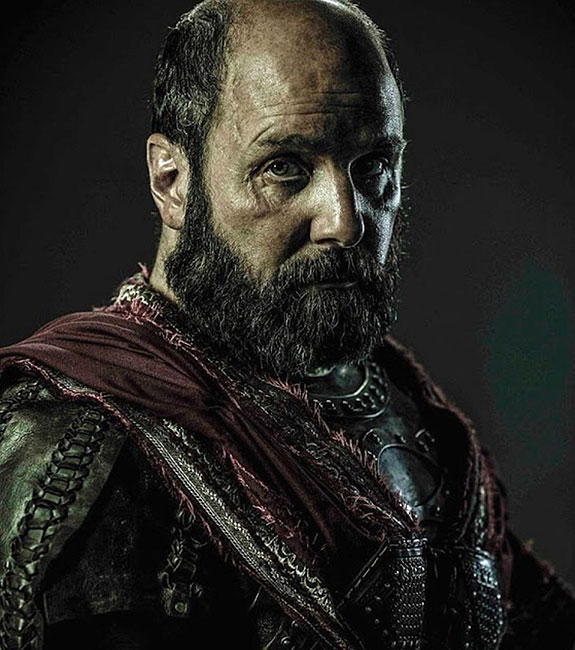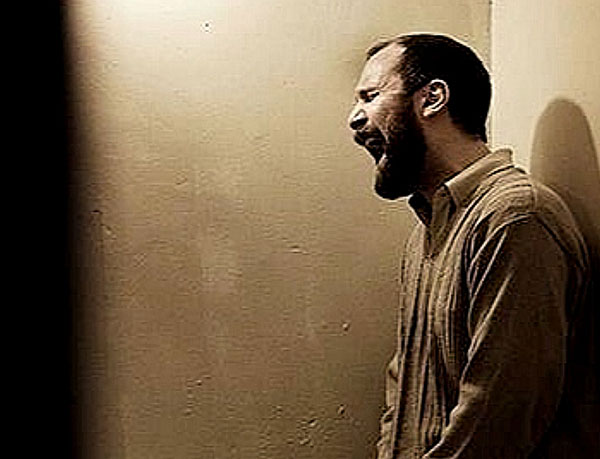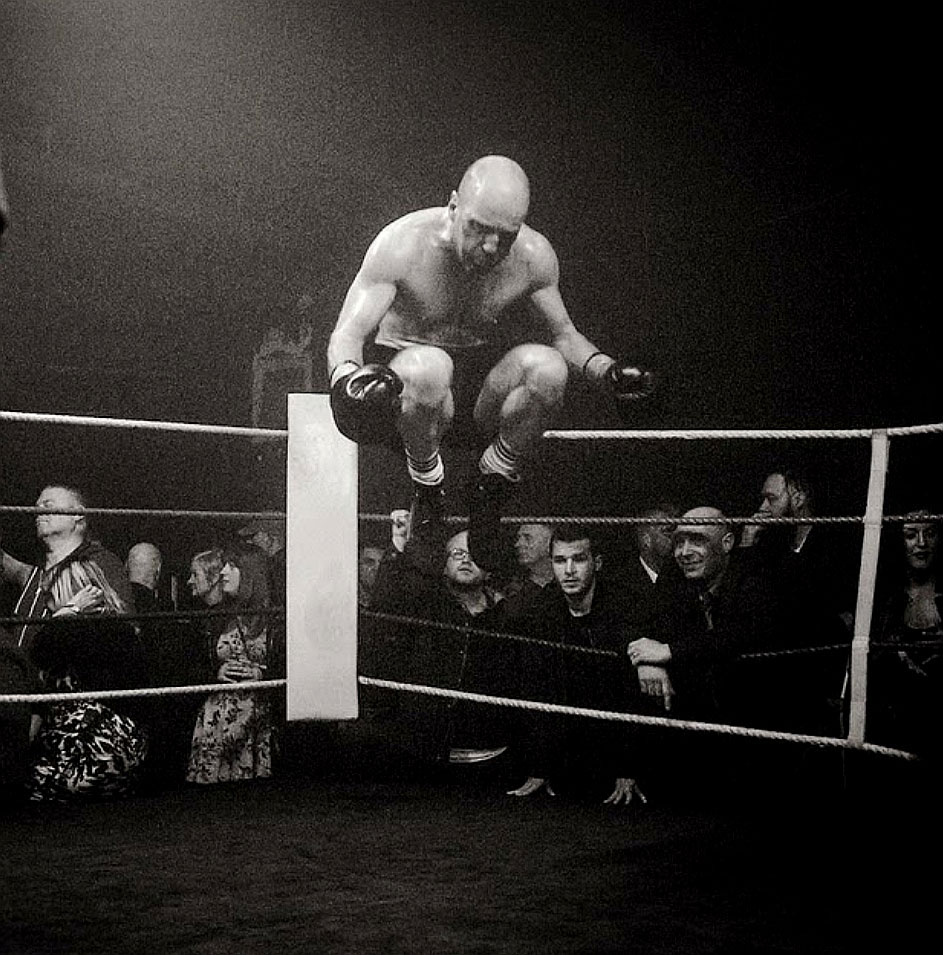Words by Joshua Phillip

In this interview I talk building’s, use of space, character building, controlling energy, and Jawbone, with actor, writer, and producer, Johnny Harris. Photo above is for Troy, shot is by Patrick Toselli. 2nd is This is England ’86 shot is by: Dean Rogers, and the last image is Jawbone shot is by: Lee Cogswell.
Thoughts on buildings and use of space?
I trained as a master locksmith and carpenter in my teens and so developed a love for quality craftsmanship of all kinds. I really appreciate beautiful buildings. I spent five months filming in Italy recently and was living in the centre of Rome. It was truly beautiful. I would go out for walks of an evening just purely to look at the beautiful architecture all around. The sheer scale of it all and the attention to detail. Beautiful Piazzas. Cobbled Avenues. Cathedrals. Fountains. I realised more than ever that ones surroundings can really affect the soul and spirit of a person. I’m not a fan of Brutalism. I’ve listened to those who say that they are… and how they find that type of architecture interesting, but I’ve lived in those buildings and they’re simply not spaces to nourish the soul. Some are well maintained, like The Southbank Centre for example, but the ones that l’ve lived in were always dilapidated, oppressive, and soul destroying environments. I grew up in an area full of these immense, monolithic, concrete blocks. Some of them have been demolished recently and replaced with green spaces and it’s a massive improvement aesthetically. I love parks. I love the foresight of those who realised we need these beautiful green spaces within our cities. My local park has been a revelation during this quarantine period. Just a simple, beautiful, green space to be able to stroll around, or sit down and relax in. A place to breathe in fresh air. It’s been uplifting to see others out exercising and enjoying themselves too. I think a lot of people have really come to appreciate our parks during this period.
You left school at 13, took up boxing and won the ABA National title at 16. Lived in Paris till 20, then studied acting at Morley College for the next 3 years. What made you decide to live in Paris, what was that experience like and why did you then take the decision to take up acting?
I actually started boxing a couple of years before that, so by the time I’d reached 13 years of age it had already become my passion.That was part of the reason I left school so young. I didn’t enjoy secondary school at all. I went to an inner city comprehensive with huge class numbers and an unruly atmosphere. I just found the whole thing really hopeless and uninspiring. My local boxing club was the very opposite. It felt vibrant and alive and safe. It was the first place that I felt I could really exert all of this energy that I had racing around inside of me. I won the Junior ABA National Title aged 16 and then a year later I met my first girlfriend. She was a French girl studying in London and she was just a really beautiful person. I fell in love for the first time. She had to return home to Paris for her studies and so I gave up boxing and went over there to be with her. It changed my life. I lived in Paris for a couple of years and I worked as a dishwasher in a restaurant on the Champs-Élysées. I met so many amazing new people. It completely opened my mind. It was during this period of my life that I first became interested in art, culture, and classic literature. I developed a real love of European cinema while living there and also became friends with a group of street-mime artists. I loved hanging out with them and watching them rehearse and perform. I just knew by that point that acting was an art form and that I really wanted to understand it. I found it magical to watch. I think my experience as a young boxer… and then going on to live in Paris had helped me develop enough courage to at least give it a try. I returned to London and enrolled in acting classes at my local adult education centre, Morley College.
What did you learn about acting at Morley and working in Fringe theatre where you started out?
So many things. My tutor at Morley College was a wonderful man named Craig Snelling. He taught me different techniques, methods and theories. The breaking down of scripts and scenes. We’d do amazing character based work that I used to absolutely love. Craig taught me about the importance and the power of subtext. What’s NOT being said in a scene is often so much more dramatic and powerful than anything someone is actually saying. I’ve learnt to love the subtext. It’s still the driving force for me. The thing that I’m searching for when I’m considering, or studying a new screenplay. What’s going on in-between the lines. What was just as important as all of the theory and the techniques that Craig was teaching me however, was his passion. He’s the most unashamedly enthusiastic man I’ve ever met. His passion and love for the work we were doing was totally infectious. He taught me to be unashamed of who I am. He encouraged me to celebrate and honour all of the life experiences, energy, and emotions that I’d been bottling up inside. He showed me how to use it all within the safety of a performance. I felt vulnerable and fearful of revealing those parts of myself at first, but then I would see Craig’s reaction and I just began to grow. I’d found a way of expressing myself… and it was exhilarating! My training at Morley College came to an end and I started out by performing in tonnes of plays in Fringe Theatres all around London. Unleashing all of that energy. Putting all that learning and education into action. Perfecting techniques, learning new ones, experimenting, making mistakes, gaining experience, growing in confidence, making friends. They were wonderful times!

Right, so you’ve a big scene to film. You’ve learned your line’s. You’re ready. What are you doing right up till that first shot and how are you controlling any nervous energy if you have any?
It’s an ever evolving process. I love that about the whole thing too. There’s no right, or wrong and my preparation for one scene might be completely different to how I prepare for another scene. Screen acting is very different to stage acting. For example, if you’re performing in a leading role, you’ll often be filming for 14 hours a day with lots of repetition, so preserving your energy and maintaining your focus are both very important. Obvious things like a good nights sleep and a nice breakfast are fundamental. I also like taking my time, so I’ll often arrive nice and early. Then it’s simply about becoming focussed. That’s why you have a trailer, or a place that you can sit quietly and prepare in the morning, or maintain your focus and energy in-between scenes throughout the day. I’ll often put some music on to evoke a general mood, or to stir up specific emotions maybe… and then I’ll slowly start to build towards the scene. I’ll look over any notes and observations I’ve made in my script and maybe have a chat with my director, or fellow actors. I’ll then begin a process that includes a physical and vocal warm up. The aim is to be alive and open to absolutely any single opportunity that may arise within a scene. That simply takes focus and freedom and can only come from being relaxed and well prepared. Knowing everything to the point of not knowing it anymore. Knowing the lines to the degree that they can leave your characters mouth as naturally as if they’ve just sprung from his mind for the very first time. Embracing and embodying the physicality of your character to the point that his ways have now become your own. You don’t even have to think about the way he walks, breathes, or speaks anymore. Knowing and feeling the subtext that’s running through him. Those unspoken secrets that are driving him, or holding him back. I believe in energy too. If a scene is very poignant and still for example, then it’s difficult to create that energy within the scene if there’s a maelstrom of activity on the set just beforehand. A good director will have everyone helping to create the right energy throughout the set and it’s a beautiful thing when that happens… the entire cast and crew all tuned into the same frequency. It’s a very powerful and beautiful thing. You can physically feel it. Then it’s time. Everything is now clarified down to this moment. The scripts are written. All the preparation’s complete. The sets have been designed and constructed. The costumes created. The make-up applied. The lights, the sound, the cameras… all ready to go. Now it all comes down to what happens between those two words “Action” and “Cut”… and at that point the floor is yours. You’re ready to play.

You wrote and starred in Jawbone. What inspired this story?
Jawbone was many things. I’d say it was more of an abstract self-portrait than a biography. An exploration of my ‘self’ in all its different forms. Each character was a representation of a different part of my own masculinity. I think ultimately it was closure. My own strange way of saying thank you, or goodbye to a part of myself that I personally needed to acknowledge. It was also me expressing myself as an artist. As a performer, I’d become frustrated with the lack of opportunity to play leading roles at the time, and so I became inspired to write one for myself. It was also very much a love letter to all the people who’d helped me throughout my life.
What was your creative process when you wrote the script for Jawbone?
It was the first screenplay I’d ever attempted to write and so I decided to rent a room in the small seaside town of Whitstable. I knew no one there and so I‘d have no distractions. I filled the place with inspirational images, reference books. I took lots of classic movies and I made a playlist of very specific music too. Songs that evoked memories and feelings that I knew would be relevant to what I was trying to express on the page. Then I just holed up in that room and I didn’t leave until the first draft was completed. I returned to London a few weeks later with the screenplay and we began producing the movie. The script then evolved and developed over the next few years, as we built the team and raised finance. The seventh draft of the script was the one that we were finally ready to shoot.
And to build the character that you played in Jawbone, what did that require?
We needed a very specific body type for the character of Jimmy McCabe. He had to convincingly hold his own in an unlicensed fight and yet also represent decades of alcoholic drinking and malnourishment. The audience had to believe both. I’d not boxed, or trained for over 25 years, so there was a physical transformation needed. I approached the former World Boxing Champion Barry McGuigan and his son, the esteemed trainer Shane McGuigan to see if they would help me prepare for the role. The McGuigan family and their team did an astonishing job. For two years, they had me training alongside World Champions like Carl Frampton, David Haye, George Groves and Josh Taylor. They gave me complete access to their world, which was invaluable. They even supplied us with an office space above their gym, so I could train downstairs during the day and then go upstairs and write in the evenings, or in-between sessions. The make-up designers also played a very important part in the process of building Jimmy McCabe. As my body was beginning to change shape, they were designing and making some beautifully subtle prosthetic pieces that helped to alter my face too. Slight swellings and scar tissue over and around each eye and cartilage across the bridge of his nose. Each swelling, broken bone, or piece of scar tissue became another subtle clue as to who this man was… and how he’d lived his life.
What is your favourite sound?
Silence.
What book’s and subjects are you interested in?
I’m currently reading ‘Why I No Longer Talk To White People About Racism.’ By Reno Eddy-Lodge and ‘Mere Christianity’ by C.S. Lewis. I’m not a member of any religious denomination, but spirituality and love interest me greatly. Exploring both of these in all their forms is a great joy in my life. They’re bigger than me… and I love that. I find it humbling. There’s not many subjects that don’t fascinate me. I’m blessed in that I still feel a great sense of wonder about the world. The mystery of it all continues to inspire me.
Rorschach Art Publication Site
rorschacharchives.blogspot.com
